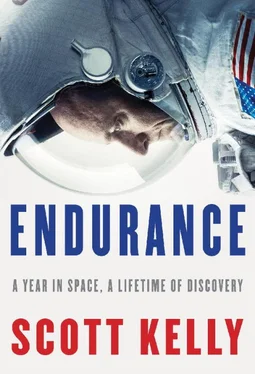“You know,” Gennady says, “it will really suck if we get hit by this satellite.”
“ Da, ” Misha agrees. “Will suck.”
Only four other times in fifteen years have crews had to shelter in place as we are now. I can hear our breathing over the sounds of the fans stirring the air inside the Soyuz. I don’t think any one of us is actually fearful. We’ve all been in risky situations before. We do talk, though, about the size and velocity of the piece of space junk coming toward us. We all agree that it’s a potentially disastrous scenario.
Misha stares out the window. I remind him that he won’t be able to see the satellite coming toward us—it will be going way too fast for the human eye to perceive, and besides, it’s dark outside. He keeps looking anyway, and soon I’m looking out my window too. The clock counts down. Once the time gets down to seconds, I feel myself tensing, starting to grimace. We wait. Then…nothing. Thirty seconds go by. We look at one another with a last heartbeat of anticipation of disaster. Then our grimaces slowly turn into expressions of relief.
“Moscow, are we still waiting?” Gennady asks.
“Gennady Ivanovich, that’s it,” Moscow mission control responds. “The moment has passed. It is safe; you can go back to work now.”
We float out of the Soyuz one by one, Gennady and Misha finish lunch, and then I spend most of the day opening all the hatches.
Later, as I reflect on the situation, I realize that if the satellite had in fact hit us, we probably wouldn’t even have known it. When an aircraft flies into a mountain in bad weather, at five hundred miles per hour, there is little left to tell the story of what went wrong: this crash would have taken place at a speed seventy times that. When I used to work on investigations of aircraft mishaps as a Navy test pilot, I would sometimes reflect that a crew might never have known that anything had gone wrong. Misha, Gennady, and I would have gone from grumbling to one another in our cold Soyuz to being blasted in a million directions as diffused atoms, all in the space of a millisecond. Our neurological systems would not even have had time to process the incoming data into conscious thought. The energy involved in a collision between two large objects at 35,000 miles per hour would be similar to that of a nuclear bomb. I think of that time I almost flew an F-14 into the water and would have disappeared without a trace.
I don’t know whether this comforts me or disturbs me.
—
IN ELEVEN DAYS, a new crew will arrive. I try not to think about how much more time I will have up here, since I know that will only make it harder. But my year in space will divide itself neatly into four expeditions of three months each, and when Kjell, Kimiya, and Oleg arrive, that will mark the passage of only one-quarter of my time here.
10

July 24, 2015
Dreamed I was on Earth, visiting New York with Amiko. We got into a taxi, and I noticed Amiko was carrying a cage with some huge spiders in it, big ones like the goliath bird-eating tarantula named Skittles that I bought Samantha for her birthday a few years ago. Our taxi driver was named Jenny, and she told us she was a postal worker moonlighting by driving a cab—in fact, she had some of the mail she was supposed to be delivering in the trunk. I got into an argument with Jenny about something, and she kicked us out of the car and drove off, with Amiko’s spiders still in the backseat. I ran after the car and got the spiders back for Amiko, then laughed when I noticed Jenny now had a flat tire.
TODAY the Expedition 44 crew arrived. Their launch was a relief after the recent Progress failures, and docking went off without a hitch. When we opened the hatch and the new guys came floating through, looking dazed as baby birds right out of the shell, I was reminded of the day I passed through the same hatch in my Captain America suit, Misha and me fitting through the opening together like a set of conjoined twins. It feels like that was years ago. The days are going by quickly, but the weeks crawl.
The three new guys will need a lot of help acclimating to the environment, getting settled, and learning to do the work. For experienced astronauts serving on ISS for the first time, the adjustment period is longer than for those who have lived here before; for first-time space travelers, like Kjell Lindgren and Kimiya Yui, it’s longer still. (This is Oleg Kononenko’s third time in space.) I trained a year for each of my flights on the space shuttle, preparing in detail for each day’s activities on a two-week mission. In the ISS era, with such a large spacecraft and much longer missions, our training is more generic. We don’t know exactly what we’re going to be doing from day to day. It’s much more challenging, and the biggest challenge is at the start of the mission.
More than two-thirds of space travelers suffer from some degree of space motion sickness, sometimes debilitating, and there isn’t much to be done but wait it out. Kjell and Kimiya both feel pretty bad on day one, and they will be nauseous and only marginally functional until their bodies adjust to the disorientation of zero g. Until they fully adapt, they will be as clumsy and tentative as babies just learning to walk. They will need help with the simplest things; even moving from one module to another without knocking shit off the walls is a challenge. They will need help talking to the ground, preparing food, using the bathroom. Even the process of throwing up requires help initially. It will take them four to six weeks to feel fully normal.
Soon after the new guys come floating through the hatch, we have a quick videoconference with the ground so they can greet their families, still in Baikonur. Most of the questions from the ground can be answered by just saying, “I’m fine. It was the ride of my life.” Misha helpfully floats an apple and an orange behind Kimiya as a visual aid while he talks.
I know Kjell and Kimiya won’t sleep well their first night here. In the middle of the night, I get up to use the bathroom and find Kjell going through bags of stuff in one of the storage modules.
“Hey, what are you looking for?” I ask him. It’s close to impossible to find anything even with the lights on, and out of courtesy Kjell has left them off.
“To tell you the truth, I’m looking for more puke bags,” Kjell says. “I’m out.”
“There’s got to be some more here somewhere,” I say. I look in the few places that seem most likely, then search in the computer inventory management system. I ask Houston where I should be looking. After a minute, they say we don’t have a stash of puke bags on board. We don’t include them among supplies sent up to the station because the Russians used to bring them on the Soyuz.
“We’ll improvise something,” I assure Kjell. As with everything else up here, vomit has a tendency to go everywhere, so there has to be a way for the bag to absorb it and hold it in place. It’s also nice to be able to wipe off your face, since surface tension holds liquids on your skin when they can’t drip off due to gravity.
Rooting through our supplies, I invent a new puke bag for Kjell made out of a ziplock bag lined with maxi pads. It works.
For much of what Kjell and Kimiya do on their second day, they need me floating at their elbows, talking them through the procedures, offering help in learning to maneuver in zero g. Kjell’s first task is to inventory the contents of a bag of spare parts that came up with them on their Soyuz and then stow them on ISS. On Earth, it would be a simple task—you could put the bag down on the floor, take everything out, and check off each item on a list as you put it back in. In space, as Kjell quickly learns, the moment you open the bag, objects jump out at you and start drifting away. Just getting everything back under control can take up all of the time that was allotted for the job.
Читать дальше













